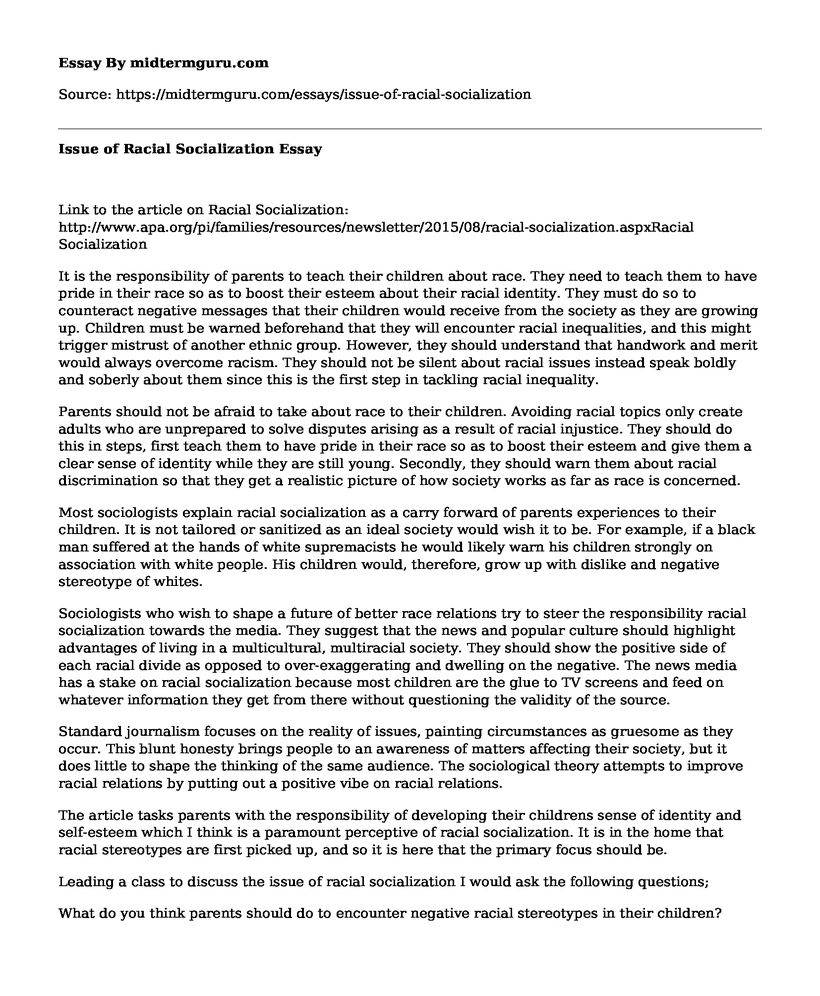Link to the article on Racial Socialization: http://www.apa.org/pi/families/resources/newsletter/2015/08/racial-socialization.aspxRacial Socialization
It is the responsibility of parents to teach their children about race. They need to teach them to have pride in their race so as to boost their esteem about their racial identity. They must do so to counteract negative messages that their children would receive from the society as they are growing up. Children must be warned beforehand that they will encounter racial inequalities, and this might trigger mistrust of another ethnic group. However, they should understand that handwork and merit would always overcome racism. They should not be silent about racial issues instead speak boldly and soberly about them since this is the first step in tackling racial inequality.
Parents should not be afraid to take about race to their children. Avoiding racial topics only create adults who are unprepared to solve disputes arising as a result of racial injustice. They should do this in steps, first teach them to have pride in their race so as to boost their esteem and give them a clear sense of identity while they are still young. Secondly, they should warn them about racial discrimination so that they get a realistic picture of how society works as far as race is concerned.
Most sociologists explain racial socialization as a carry forward of parents experiences to their children. It is not tailored or sanitized as an ideal society would wish it to be. For example, if a black man suffered at the hands of white supremacists he would likely warn his children strongly on association with white people. His children would, therefore, grow up with dislike and negative stereotype of whites.
Sociologists who wish to shape a future of better race relations try to steer the responsibility racial socialization towards the media. They suggest that the news and popular culture should highlight advantages of living in a multicultural, multiracial society. They should show the positive side of each racial divide as opposed to over-exaggerating and dwelling on the negative. The news media has a stake on racial socialization because most children are the glue to TV screens and feed on whatever information they get from there without questioning the validity of the source.
Standard journalism focuses on the reality of issues, painting circumstances as gruesome as they occur. This blunt honesty brings people to an awareness of matters affecting their society, but it does little to shape the thinking of the same audience. The sociological theory attempts to improve racial relations by putting out a positive vibe on racial relations.
The article tasks parents with the responsibility of developing their childrens sense of identity and self-esteem which I think is a paramount perceptive of racial socialization. It is in the home that racial stereotypes are first picked up, and so it is here that the primary focus should be.
Leading a class to discuss the issue of racial socialization I would ask the following questions;
What do you think parents should do to encounter negative racial stereotypes in their children?
Should social media be censored so that content on negative racial stereotyping and poor race relations is restricted? Why do you think so?
What are the messages that we can focus on and disseminate that emphasize pride, fairness, and tolerance in the members of every particular race?
Cite this page
Issue of Racial Socialization. (2021, May 19). Retrieved from https://midtermguru.com/essays/issue-of-racial-socialization
If you are the original author of this essay and no longer wish to have it published on the midtermguru.com website, please click below to request its removal:
- Paper Example on Five Communication Principles
- Paper Example on Family Violence
- Representation of Women and Other Gender Issues Affecting the Female Characters in TV Shows
- Virtual Team Management - Research Paper
- The Great Disparity: 30 yrs of Middle Class Perfection Shattered - Essay Sample
- Two Worlds, One Marriage: Exploring Cultural Differences - Essay Sample
- Fast Food: Why Do People Choose Unhealthy Options? - Essay Sample







